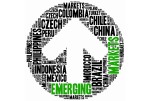India and China battle for investor attention (Emerging Market Equity Roundtable – Part 2)
India and China battle for investor attention (Emerging Market Equity Roundtable – Part 2)

Many investors are talking about a lost decade for emerging market equities. After all, emerging markets have lagged behind the US stock market in recent years. Countries such as India still offered some hope. During the second part of the Roundtable on Emerging Market Equities with seven experts and chairman Han Dieperink, CIO at Auréus, the discussion focused on India and the impact of US trade tariffs.
By Manno van den Berg
This is part 2 of the report. You can read part 1 here, and part 3 will be published on Friday 20 June.
|
MODERATOR Han Dieperink, Auréus.
PARTICIPANTS Cemre Demirkazik, Carmignac Weichen Ding, bfinance Thomas Kieselstein, Quoniam Asset Management Samuel Lo, Morningstar Tom Niemans, Goldman Sachs Asset Management Andrea Salvatori, Amundi Ramon Tol, Achmea Investment Management |
India is one of the best-performing emerging markets. Is there such a thing as “India exceptionalism”? What is the impact of the US tariff war?
Kieselstein: 'As always, it's a trade-off between valuation and growth. On the growth side, India has many advantages. Demographics are perhaps the most important – completely different from China. India is undergoing rapid digitalisation and is increasingly involving the population in this process. But you are right, valuations are on the high side. India is trading at roughly the same level as the US, which is high for an emerging market. The value segment of emerging markets – China, but also Latin America – is now so cheap that I would rather exit India and look towards Latin America. As far as the trade war is concerned, India is more dependent on domestic consumption, so higher tariffs are unlikely to hurt profit growth much. I am less certain about IT. India exports a lot of IT services, and if everyone around the world has to cut back on investment, I don't see that sector flourishing.'
Niemans: 'There are a number of positive factors regarding India's economy. Around 70% of GDP comes from domestic consumption, which is certainly distinctive. What also makes India unique is that it offers diversification compared to other EM countries, with different sector weightings – think less technology/semi-conductors and e-commerce. India has a unique position in the global economy. It was able to import coal and crude oil from Russia at reduced prices. India seems to have been less affected by trade tariffs. In February, talks were already underway with the US about a bilateral trade deal. India promised to buy more energy and spend more on defence in the US.'
Tol: 'Before the tariff increases, GDP growth of more than 6% was forecast for India next year, compared to just over 4% for China. This difference in growth is likely to continue in the coming years. Unfortunately, the fairly high valuations of Indian equities also seem to reflect this.
Commodity prices are important because India is a net importer of raw materials. If prices fall, India will benefit. Demirkazik: 'India certainly has some exceptional features. It is the only country with high growth, a large domestic economy, solid external balances, rising and stable reserves, low political and geopolitical risks, and very high-quality economic governance.
They have one of the most advanced payment systems in the world. The stock market correction we have seen in India since September is healthy. Valuations had become too high, especially for small and mid caps.'
Will you choose India or China for the next ten years?
Demirkazik: 'We are using the correction to slowly increase our allocation to India. China is a more difficult choice. Before “Liberation Day”, there was a slight upturn in growth, but we think this will weaken again in the second quarter unless the government introduces new stimulus measures. There are structural negative factors: the demographics are similar to what we saw in Japan a few decades ago. The property market is not fully recovering. The biggest problem facing the Chinese economy is enormous overcapacity. Supply is growing faster than demand. On the positive side, of course, there is the revolution in AI and technology. Chinese companies – think DeepSeek and electric vehicles – have made great strides in this area, and this has been underestimated by the markets. In terms of valuation, the market is so pessimistic that opportunities are now emerging. Some companies are even trading below their cash position – something that should not be possible in financial theory.'
Lo: 'We are currently more positive about China than India. For investors, it's all about returns, but also about fundamentals and valuations. India has many attractive features: its demographics, the quality of its companies, its focus on profitability and return on investment. But on the other hand, China is very cheap in terms of valuation. Large Chinese companies continue to innovate – think of DeepSeek, for example. We see a lot of potential for India, even as a global power. But in the short term, valuations are very high, which is partly the cause of the recent correction.'
Ding: 'At the moment, the Chinese market is very cheap. It is being ignored or underweighted by international investors. Nevertheless, you can find excellent companies at very attractive prices. Be selective, though, and take into account policy risks, geopolitical risks and corporate governance issues. India is strategically well positioned: it is not a US target like China. Secondly, China has enjoyed fantastic GDP growth over the past five years, but the stock market – particularly the China A market – has performed poorly. The Indian stock market is a better reflection of the economy, allowing you to really benefit from the macroeconomic growth story.'
Europe has been shaken awake by Trump's actions. Could these also lead to more reforms in China that investors could benefit from?
Lo: 'The Chinese economy is huge and autonomous, which gives it room to chart its own course. But it is not an island; it feels the pressure from the US. A few years ago, we were talking about “shared prosperity” in China: good for the country, but bad for investor sentiment and for some companies. But the tone has softened considerably since then. China is trying to stimulate local business. This is a serious attempt: significant changes are already underway.'
Who will win this trade war: Trump or China?
Lo: 'That's like betting on a fight between Mike Tyson and Muhammad Ali.'
Ding: 'The high tariffs brought trade between China and the US to a virtual standstill in April. That was not a tenable situation. A solution is obvious, given the impact on all those involved. Both American consumers and Chinese factories are feeling the pain of import duties.'
Tol: 'You can already see that happening. Whereas the Chinese government used to focus primarily on infrastructure, the emphasis is now on domestic consumers. That will certainly help.'
|
Han Dieperink Han Dieperink is an independent consultant through his company HD Capital & Advisory. He is Chief Investment Officer at Auréus and Senior Advisor at BB Capital, a Dutch private equity investor. He also writes books, columns and a weekly newsletter. Dieperink was Chief Investment Officer at Rabobank until 2019 and held the same position at Schretlen & Co. before 2010. Prior to that, he was an officer in the Royal Netherlands Navy. |
|
Cemre Demirkazik Cemre Demirkazik is Senior Product Specialist, specialising in emerging markets, and co-Head of the Product Specialists team at Carmignac. She joined the company in 2014 as Product Specialist and was appointed Manager of the team in 2024. Prior to that, she worked at Aviva Investors and DeriveXperts. Demirkazik graduated from the Université Paris Dauphine with a Master's degree in Economic and Financial Engineering. |
|
Weichen Ding Weichen Ding is Director in the Equity team at bfinance, specialising in research on equity managers, with a focus on emerging market equity strategies and quantitative strategies. Before joining bfinance, Ding worked for five years as a Research Analyst Manager at Alvarium Investments. He holds an MSc in Economics from University College London and a BSc in Information Security from Fudan University, China. |
|
Thomas Kieselstein Thomas Kieselstein has been providing strategic guidance to Quoniam since 2023, particularly with regard to the investment process. As co-founder and former Chief Investment Officer, he played a crucial role in shaping the company's development. Previously, he worked at DZ Bank and Dresdner Investment Group (now Allianz Global Investors). He holds a degree in Industrial Engineering from the University of Karlsruhe (KIT). |
|
Samuel Lo Samuel Lo is Principal, Manager Research at Morningstar Asia Limited, a subsidiary of Morningstar, Inc. He is part of the cross-border manager research team and focuses on equity strategies in Asia. Before joining Morningstar in 2019, Lo worked as an Equity Research Analyst for two years. He began his career as a Securitisation Analyst at Crédit Agricole CIB. |
|
Tom Niemans Tom Niemans is Executive Director and Co-Head of the External Investing Group (XIG) team in the Netherlands. He has nearly 15 years of experience in the financial sector, including 12 years focusing on manager selection and monitoring and advising on investment portfolios. Niemans is a CFA charterholder and holds a Master's degree in International Business from Maastricht University. |
|
Andrea Salvatori Andrea Salvatori is Head of Emerging Market ESG at Amundi Asset Management and is responsible for portfolio management of Global Emerging Market Equity, Latin America and several ESG-focused equity strategies. He plays a crucial role in integrating ESG factors into investment decisions. Previously, he was Head of Equity Research for Emerging Markets, among other roles. |
|
Ramon Tol Ramon Tol was responsible for setting up, implementing and executing the manager monitoring and selection process at Blue Sky Group. He currently works as Senior Portfolio Manager Equities at Achmea Investment Management. Tol regularly speaks at international conferences on manager selection, monitoring and transition management and publishes regularly in academic journals and economic magazines. |
















